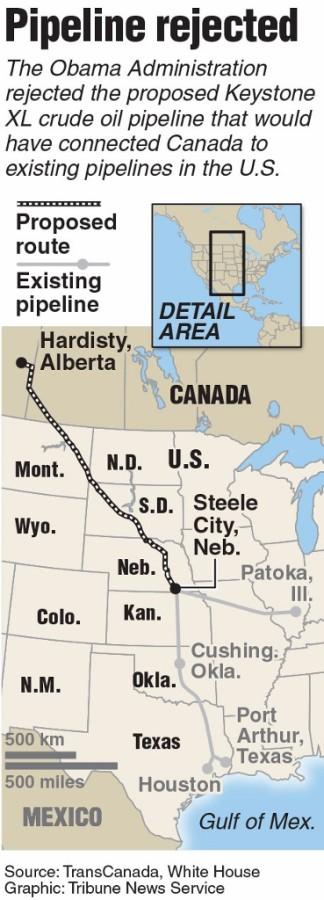Obama rejects Keystone pipeline, citing no meaningful boost to economy
Map locating the proposed path of the Keystone pipeline.
November 9, 2015
By Sean Cockerham
WASHINGTON — President Barack Obama on Friday rejected the Keystone XL pipeline, moving to bolster his environmental legacy after reviewing for seven years what has become the nation’s most heated political dispute over climate change, jobs and energy development.
The decision was largely based on international politics, coming less than a month before the president goes to Paris for global climate talks. Obama has been pressing other nations to act on climate change and said approving the pipeline “would have undercut that global leadership.”
Obama has become far more assertive on environmental issues in his second term and the decision will be a key part of his legacy as he prepares to leave office after next year’s presidential election.
His rejection of the pipeline may not mean the long national debate over Keystone is over, though.
TransCanada, the company seeking to build the pipeline, said it is considering reapplying for the presidential permit. The success of a new application would depend on who is in the White House. All the major Republican candidates running for president support Keystone, while Democratic candidates Hillary Clinton and Bernie Sanders oppose the project.
“Today, misplaced symbolism was chosen over merit and science — rhetoric won out over reason,” TransCanada CEO Russ Girling wrote in a statement.
Speaking from the Roosevelt Room in the White House, Obama said Friday that he rejected the pipeline after Secretary of State John Kerry told him the State Department review had determined that it was not in the national interest.
“The pipeline would not make a meaningful long-term contribution to our economy,” Obama said. “Shipping dirtier crude oil into our country would not increase America’s energy security.”
Keystone was expected to create thousands of construction jobs, but only about 35 permanent jobs.
Obama’s decision brought an immediate backlash from business groups and Republicans, with GOP presidential candidate Jeb Bush tweeting that “the Obama Admin’s politically motivated rejection of the Keystone XL Pipeline is a self-inflicted attack on the U.S. economy and jobs.”
Obama said the political debate on the merits of the Keystone pipeline had become “overinflated.”
“All of this obscured the fact that this pipeline would neither be a silver bullet for the economy, as was promised by some, nor the express lane to climate disaster proclaimed by others,” he said.
The State Department’s review, which attracted nearly 5 million public comments, concluded that the 800,000-barrel-a-day pipeline would have little impact on greenhouse gas emissions or the economy. State Department officials said the international perception, though, would have been that approving Keystone was inconsistent with U.S. leadership on climate change.
Kerry said the critical factor in his determination that allowing the pipeline was not in the national interest was the consideration that “moving forward with this project would significantly undermine our ability to continue leading the world in combating climate change.”
The pipeline was proposed to run 1,179 miles from the Western Canada oil sands in Alberta to refineries in Texas. Environmental groups seized on government estimates that the Canadian oil results in 17 percent more planet-warming carbon emissions than other sources of oil.
©2015 McClatchy Washington Bureau
Visit the McClatchy Washington Bureau at www.mcclatchydc.com
Distributed by Tribune Content Agency, LLC.
—————
















